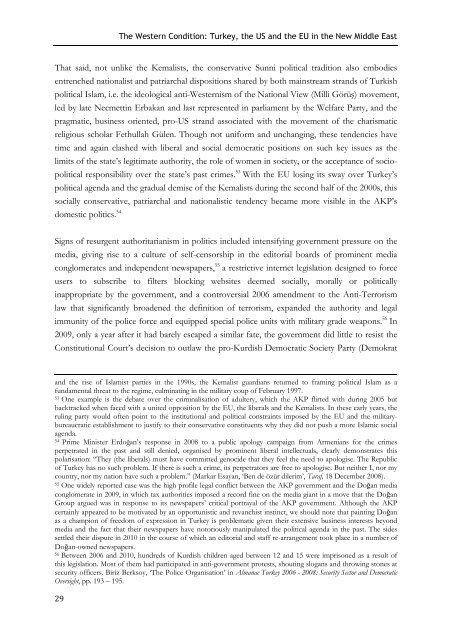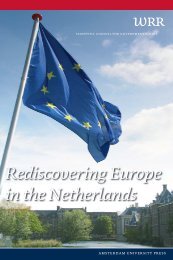The Western Condition - St Antony's College - University of Oxford
The Western Condition - St Antony's College - University of Oxford
The Western Condition - St Antony's College - University of Oxford
Create successful ePaper yourself
Turn your PDF publications into a flip-book with our unique Google optimized e-Paper software.
<strong>The</strong> <strong>Western</strong> <strong>Condition</strong>: Turkey, the US and the EU in the New Middle East<br />
That said, not unlike the Kemalists, the conservative Sunni political tradition also embodies<br />
entrenched nationalist and patriarchal dispositions shared by both mainstream strands <strong>of</strong> Turkish<br />
political Islam, i.e. the ideological anti-<strong>Western</strong>ism <strong>of</strong> the National View (Milli Görüş) movement,<br />
led by late Necmettin Erbakan and last represented in parliament by the Welfare Party, and the<br />
pragmatic, business oriented, pro-US strand associated with the movement <strong>of</strong> the charismatic<br />
religious scholar Fethullah Gülen. Though not uniform and unchanging, these tendencies have<br />
time and again clashed with liberal and social democratic positions on such key issues as the<br />
limits <strong>of</strong> the state’s legitimate authority, the role <strong>of</strong> women in society, or the acceptance <strong>of</strong> sociopolitical<br />
responsibility over the state’s past crimes. 53 With the EU losing its sway over Turkey’s<br />
political agenda and the gradual demise <strong>of</strong> the Kemalists during the second half <strong>of</strong> the 2000s, this<br />
socially conservative, patriarchal and nationalistic tendency became more visible in the AKP’s<br />
domestic politics. 54<br />
Signs <strong>of</strong> resurgent authoritarianism in politics included intensifying government pressure on the<br />
media, giving rise to a culture <strong>of</strong> self-censorship in the editorial boards <strong>of</strong> prominent media<br />
conglomerates and independent newspapers, 55 a restrictive internet legislation designed to force<br />
users to subscribe to filters blocking websites deemed socially, morally or politically<br />
inappropriate by the government, and a controversial 2006 amendment to the Anti-Terrorism<br />
law that significantly broadened the definition <strong>of</strong> terrorism, expanded the authority and legal<br />
immunity <strong>of</strong> the police force and equipped special police units with military grade weapons. 56 In<br />
2009, only a year after it had barely escaped a similar fate, the government did little to resist the<br />
Constitutional Court’s decision to outlaw the pro-Kurdish Democratic Society Party (Demokrat<br />
and the rise <strong>of</strong> Islamist parties in the 1990s, the Kemalist guardians returned to framing political Islam as a<br />
fundamental threat to the regime, culminating in the military coup <strong>of</strong> February 1997.<br />
53 One example is the debate over the criminalisation <strong>of</strong> adultery, which the AKP flirted with during 2005 but<br />
backtracked when faced with a united opposition by the EU, the liberals and the Kemalists. In these early years, the<br />
ruling party would <strong>of</strong>ten point to the institutional and political constraints imposed by the EU and the militarybureaucratic<br />
establishment to justify to their conservative constituents why they did not push a more Islamic social<br />
agenda.<br />
54 Prime Minister Erdoğan’s response in 2008 to a public apology campaign from Armenians for the crimes<br />
perpetrated in the past and still denied, organised by prominent liberal intellectuals, clearly demonstrates this<br />
polarisation: “<strong>The</strong>y (the liberals) must have committed genocide that they feel the need to apologise. <strong>The</strong> Republic<br />
<strong>of</strong> Turkey has no such problem. If there is such a crime, its perpetrators are free to apologise. But neither I, nor my<br />
country, nor my nation have such a problem.” (Markar Esayan, ‘Ben de özür dilerim’, Taraf, 18 December 2008).<br />
55 One widely reported case was the high pr<strong>of</strong>ile legal conflict between the AKP government and the Doğan media<br />
conglomerate in 2009, in which tax authorities imposed a record fine on the media giant in a move that the Doğan<br />
Group argued was in response to its newspapers’ critical portrayal <strong>of</strong> the AKP government. Although the AKP<br />
certainly appeared to be motivated by an opportunistic and revanchist instinct, we should note that painting Doğan<br />
as a champion <strong>of</strong> freedom <strong>of</strong> expression in Turkey is problematic given their extensive business interests beyond<br />
media and the fact that their newspapers have notoriously manipulated the political agenda in the past. <strong>The</strong> sides<br />
settled their dispute in 2010 in the course <strong>of</strong> which an editorial and staff re-arrangement took place in a number <strong>of</strong><br />
Doğan-owned newspapers.<br />
56 Between 2006 and 2010, hundreds <strong>of</strong> Kurdish children aged between 12 and 15 were imprisoned as a result <strong>of</strong><br />
this legislation. Most <strong>of</strong> them had participated in anti-government protests, shouting slogans and throwing stones at<br />
security <strong>of</strong>ficers. Biriz Berksoy, ‘<strong>The</strong> Police Organisation’ in Almanac Turkey 2006 - 2008: Security Sector and Democratic<br />
Oversight, pp. 193 – 195.<br />
29

















